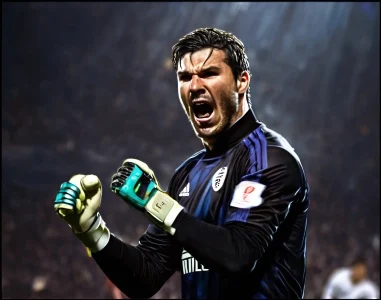Very few Scandinavian goalkeepers have
been fortunate enough to have illustrious career with silverwares or remarkable
display at the top level.
Goalkeepers
seem to keep being underrated figures in a team, especially in the offensive sides.
Scandinavian shot-stoppers are no different. In fact, very few of them earned
sufficient credits. Unlike in Italy, England, Germany or the eccentric ones in
South America, the men between the sticks in Nordic side tend to be less
popular.
This
season, there is one potential name who could be the next best Scandinavian
goalie. Lukas Hradecky,
a Finland international, is only a few steps away from winning the Bundesliga
with Bayer Leverkusen, who are already 13 points ahead of the expected and
defending champions Bayern Munich.
The
former Eintracht Frankfurt man is set to follow these names who were able to
stand out or deserved more credit for their role in their team’s success, both
at the club and international levels. One of them was even able to lift the
prestigious trophies such as UEFA Champions League and European Championship,
beside domestic titles.
Kasper Schmeichel (Denmark)
The former Manchester City and OGC Nice goalkeeper is one of
the few noteworthy Scandinavian goalkeepers in modern times. Unlike his father,
Peter, he does not appear to be destined to play for major clubs. Kasper was the key figure in Leicester City’s
triumphant years as they clinched Premier League title in 2016, FA Cup and Community
Shied 2021.
In
the international fixtures, the current Anderlecht man was instrumental in
Denmark’s campaign in 2018 FIFA World Cup despite only reaching the round of
16, and in EURO 2020 when they advanced to the semifinal. He kept clean sheet
three times in the former but only once in the latter tournament. It was
Denmark’s best result in major tournament since snatching EURO 1992. His contributions have earned him
four Danish Best Player awards: in 2016, 2017, 2019, and 2020.
The
37-year old goalkeeper is still the mainstay and seeking for redemption in EUR0
2024 next summer. Their last international campaign in 2022 FIFA World Cup
ended in early exit by only collecting one point. In Germany 2024, Denmark is
seeded in group C alongside, Slovakia, Serbia and England.
Thomas Ravelli (Sweden)
He
was part of the squad in Sweden’s last golden era in 1990s. He did not only
contribute well at the international stage but also at the club level. Ravelli
helped Blagut reach semifinal in two major competitions consecutively, EURO
1992 and 1994 FIFA World Cup. He was in form in the latter tournament,
especially while sharing spoils against Brasil at the group stage and defeating Romania on penalties in the quarterfinals, in which he saved twice.
At
the club level, the towering shot-stopper rose to prominence while playing for
IFK Goteborg. Aside from winning six league titles, Ravelli brought them to go
through the latter stage in the 1993 and 1995 Champions Cup. In the former,
Oster man led his club to the final group stage prior to the summit and the
quarterfinal in the latter. His form particularly significant in the UEFA
Champions League. He
finally moved abroad, joining MLS club Tampa Bay Munity in 1998 before hanging
up his gloves. During his lengthy career, he was named Swedish Player of the
Year in 1981 and Sweden's Best Goalkeeper in 1995 and 1997.
Peter Schmeichel (Denmark)
The Great Dane is unquestionably the greatest Nordic
custodian of all time. He was a serial winner in his prime. Peter won four
league titles for Brondby, five Premier League titles, plus three FA Cups, one
UEFA Super Cup and one UEFA Champions League for Manchester United, and the
long-awaited league title for Sporting Lisbon during his brief spell in Portugal.
He also thrived in the international competition. Schmeichel’s role was instrumental when Denmark clinched EURO 1992. He was named the best goalkeeper in the tournament after keeping clean sheets in a stalemate against England and in the final while beating Germany 2-0. He also represented his country alongside Laudrup brothers when they advanced quarterfinal in 1998 FIFA World Cup, their best result at global stage so far. So far, the former Aston Villa and Manchester City shot stopper has been awarded Danish Player of the Year and UEFA Best goalkeeper three times each, plus EPL Best Player in 1996.



Comments
Post a Comment